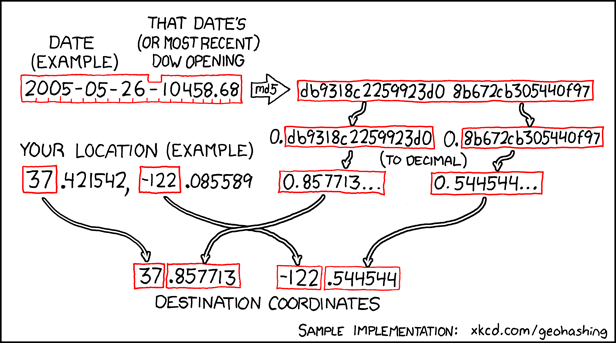Prometheus exporter to be alert about nearby xkcd Geohashes.
The only real requirement is the Go programming language in version 1.17 or newer. Maybe older versions will work as well. Or newer versions won't. I just had 1.17 installed.
You might also wanna have Prometheus running somewhere, as otherwise it is somehow useless.
$ go build ./cmd/geohashing_exporter
$ ./geohashing_exporter
For a test drive, the exporter can be curled.
In this example, the coordinates for the coordinate window (50, 8), their neighboring windows, and the Globalhash will be queried.
$ export LAT=50 LON=8 TZ=Europe/Berlin
$ curl "http://localhost:9426/metrics?lat=${LAT}&lon=${LON}&tz=${TZ}"
# HELP geohashing_lat Latitude of the geohash.
# TYPE geohashing_lat gauge
geohashing_lat{day_offset="0",location="center"} 50.67375165844576
[…]
# HELP geohashing_lon Longitude of the geohash.
# TYPE geohashing_lon gauge
geohashing_lon{day_offset="0",location="center"} 8.193304942971343
[…]
There are only two metrics: geohashing_lat and geohashing_lon representing the GPS latitude and longitude of a Geohash.
More information is passed through the labels:
day_offsetis an integer indicating when those coordinates are valid, where0is today,1is tomorrow and so on. Future days might be available when the New York Stock Exchange (NYSE) will be closed - either due to weekends or holidays.locationspecifies where the Geohash is located with respect to the requested window:centeris the Geohash within the requested window,nw,n,ne,w,e,sw,s, andsedescribes the Geohash in the coordinate windows northwest, north, …, and southeast of the requested window, andglobalis the unique Globalhash independent of the requested coordinates.
Btw, in the new world and everywhere west of the longitude -30 there might be no Geohash available between midnight and the NYSE's opening, in New York time. This is called the 30W Time Zone Rule or sometimes W30 as I oppose consistency.
Finally, you can configure a scrape_config in your Prometheus configuration like the following example.
scrape_configs:
- job_name: "geohashing"
params:
lat: ["50"]
lon: ["8"]
tz: ["Europe/Berlin"]
static_configs:
- targets: ["localhost:9426"]Unfortunately, the PromQL does not enable you to calculate the distance between two GPS coordinates in a straight forward way. Very sad!
That's why the contrib/prometheus/rule_gen.py script allows you transpiles the Haversine formula against a known location, e.g., your home.
As an example, let's generate a PromQL queries to be used as an alerting rule expr to match Geohashes next to 30km and Globalhashes next to 250km near the Marburg castle.
$ ./contrib/prometheus/rule_gen.py 50.810222 8.767017 30
$ ./contrib/prometheus/rule_gen.py --globalhash 50.810222 8.767017 250
The final alerting rule can be admired in the contrib/prometheus/rules-geohashing.yml file.
Feel free to use a variant of this as one of your Prometheus rule_files.
In the odd case that an over-engineered Go library might be needed for the Geohashing algorithm, it is available in the geohash directory.
The documentation can be shown with
$ go doc -all ./geohash
or in this web documentation thingy.
Should the license - GNU GPLv3 - be an obstacle for your Geohashing-related startup, I am happy to be contacted to arrange an industry standard agreement.
What isn't? And even if, would this change a thing?
